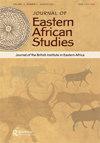非事件:埃塞俄比亚批准非洲妇女权利框架
IF 0.6
3区 社会学
Q2 AREA STUDIES
引用次数: 0
摘要
摘要 埃塞俄比亚作为非洲联盟的东道国,十五年来一直没有批准非洲妇女权利框架(《马普托议定书》)。现实主义、自由主义和建构主义学者对各国批准人权条约的原因进行了理论分析,而本文则提出了 "为什么不批准?根据在亚的斯亚贝巴进行的访谈、档案材料、文件分析和实地调查,文章探讨了通过人权条约的主要解释,如捐助者的压力、合法性、政治制度的开放性和规范的一致性。通过分析埃塞俄比亚政府多次决定不批准《马普托议定书》,最后才悄无声息地批准了该议定书,并提出了一长串保留意见,文章认为,各国通过地区性人权条约的原因可能与通过全球性条约的原因不同。通过追溯从早期试图通过《马普托议定书》到2018年批准《议定书》的这一 "非事件",文章深入分析了埃塞俄比亚复杂的国家背景下妇女权利的近代史,包括妇女运动的兴起、公民空间的关闭、日益增长的独裁主义、反权利言论以及为改革铺平道路的政府危机。本文章由计算机程序翻译,如有差异,请以英文原文为准。
A non-event: ratifying the African Women’s Rights framework in Ethiopia
ABSTRACT Ethiopia, the host of the African Union, did not ratify the African Women’s Rights framework (the Maputo Protocol) for fifteen years. While realist, liberal and constructivist scholars have theorised why countries ratify human rights treaties, this article adds to this debate by asking ‘why not?’. Based on interviews, archival material, document analysis and fieldwork in Addis Ababa, the article explores the dominant explanations for adopting human rights treaties, such as donor pressure, legitimacy, openness of a political system and normative alignment. By analysing the Ethiopian government’s decision not to ratify the Maputo Protocol on numerous occasions before finally ratifying it quietly and with a long list of reservations, the article argues that countries may adopt regional human rights treaties for different reasons than the global ones. By tracing this ‘non-event’ from the early attempts to adopt the Maputo Protocol until its ratification in 2018, the article provides an in-depth analysis of the recent history of women’s rights in Ethiopia’s complex national context, including the rise of women’s movements, closing civil space, growing authoritarianism, anti-rights rhetoric, and a government crisis that paved way for reform.
求助全文
通过发布文献求助,成功后即可免费获取论文全文。
去求助
来源期刊

Journal of Eastern African Studies
AREA STUDIES-
CiteScore
3.30
自引率
7.10%
发文量
12
期刊介绍:
Journal of Eastern African Studies is an international publication of the British Institute in Eastern Africa, published four times each year. It aims to promote fresh scholarly enquiry on the region from within the humanities and the social sciences, and to encourage work that communicates across disciplinary boundaries. It seeks to foster inter-disciplinary analysis, strong comparative perspectives, and research employing the most significant theoretical or methodological approaches for the region.
 求助内容:
求助内容: 应助结果提醒方式:
应助结果提醒方式:


